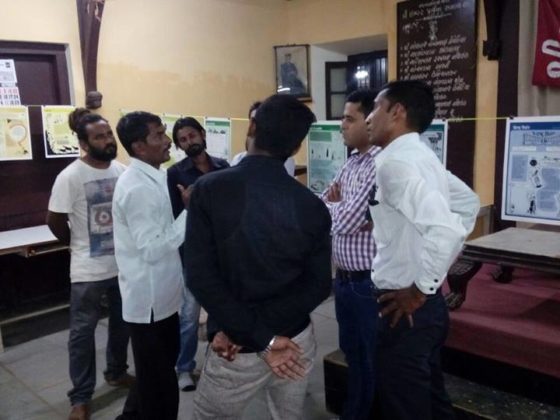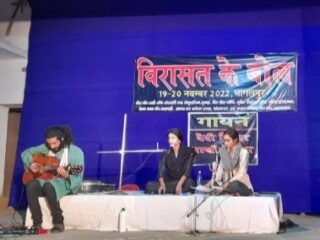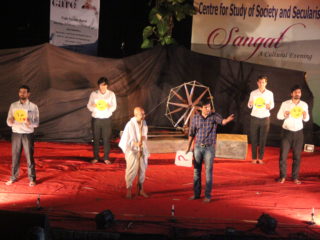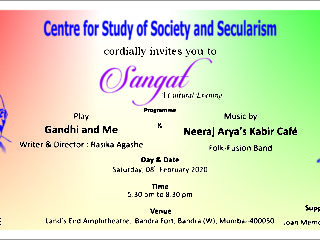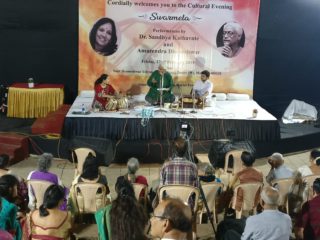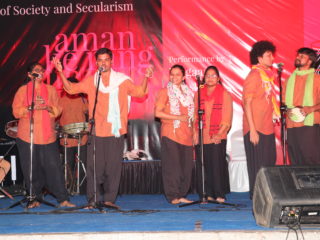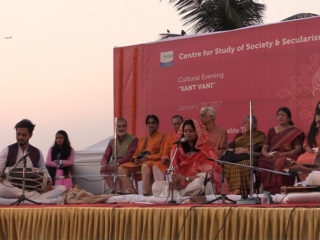“Hinduism allows diverse ideas and one idea of religion shouldn’t be enforced on all’, said Swami Devkantyananda from Ram Krishna Mission speaking at Interfaith Iftar for peace and harmony organized by National Council of Churches in India (NCCI), Centre for Study of Society and Secularism (CSSS) and Indian Christian Women’s Movement, Mumbai Chapter (ICWM) on 29th May, 2019 at YMCA International House, Mumbai.
Globally when certain forces are trying to create conflicts among people of different religions, there is polarization and hate being propagated; can religion become the resource for people to come together? The motive behind organizing the program was to bring to the fore the narrative of peace and harmony in every religion. To stop the cycle of attacks on each other’s religions, a step toward peace for all is essential. In the wake of the recent attacks on places of worship of different religions especially in Sri Lanka and New Zealand and the narrative of hatred being spread even in India, this program sent out a message of unity amongst all the faiths as response to that narrative.
The program began with a welcome message by the representatives of all the three host organisations. Rev. Mathew Abraham from NCCI while welcoming the guests said that their organization stands for freedom of religion and dignity of life for all. Director of CSSS, Irfan Engineer, said that we should all stand united in the face of hatred to spread peace and harmony. Shobha Philip, co-ordinator of ICWM, said that their organization also supports the various activities conducted in the city for promoting justice and peace.
Eminent dignitaries from Hinduism, Islam, Christanity, Jainism, Buddhism, Baha’i faith and Zoroastrianism spoke about their religious traditions which promote peace and harmony. Though the speakers were talking from different stand points of their respective religions, all of them came together in support of peace and unity amongst all. Maulana Arif Umri spoke about the tradition of fasting in the holy month of Ramzan in the Islam as a way to promote brotherhood amongst all and also instill a sense of self control amongst the followers. Similarly, Swami Devkantyananda said that there is unity in diversity not in uniformity therefore all the religions should be allowed to flourish equally. Bishop Allwyn D’souza, the Archdiocese of Mumbai, gave a very succinct message of peace, following what the earlier two speakers had mentioned, that everyone should realize and respect dignity of life for humans which is the path towards achieving peace and harmony. Bishop of the Methodist Church in India, Bishop Anil Kumar Sarvand who also asserted the need for harmony when he said that there should be a dialogue between people of different religions which advocates justice and peace. The engagement, he elaborated, should be on three levels – friendship, faith and experience.
From the Baha’i faith Sheriar Noozeydan said followers of the Baha’i religion will always stand in solidarity with followers of other religions to pursue the goal of peace and harmony. An academician with expertise in Jainology Jainism, Kamini Gogri asserted that the Jain religion has three main tenets – non-violence, non-possession and non-absolutism. Non absolutism refers to respecting the diversity and giving up the biases and prejudices about people from other religions. In the current environment where hatred is promoted by certain section of the society, Prof. Sunil Kamble from the Pali Department of University of Mumbai said that we should practice two things to keep the society united – to restrain from violence and to restrain from abuse. He added that no religion will disagree with these two principles which eventually create peaceful societies.
Shehernaz Nalwalla, a retired Professor from Wilson College, spoke about the basic tenets of the Zoroastrian faith which say – good thoughts, good words and good deeds. She said if one follows these three it will eventually lead to harmony in the society. She also spoke about charity and the sense of giving to the society as a practice in the Zoroastrian faith which should be followed by all irrespective of their religions. Prof. Sharmila Virkar, Department of Philosophy, University of Mumbai noted that the uniqueness of Hinduism lies in its diversity. It doesn’t have one scripture or one ritual or one God. It has always respected and embraced the multiplicity of views to promote peace in the society.
The fellowship continued over dinner where people got to know more about each other and about the faiths they follow. The program was attended by more than 70 participants who belonged to different faiths and included prominent heads of various religions, academicians, peace workers and journalists. One of the positive things to be noted was the participation of women which the organizers had taken utmost care of. The program generated good will amongst the people of different religions and was successful in the giving the message of unity and love in the time of hate and saw religious heads of different religions on one platform.


